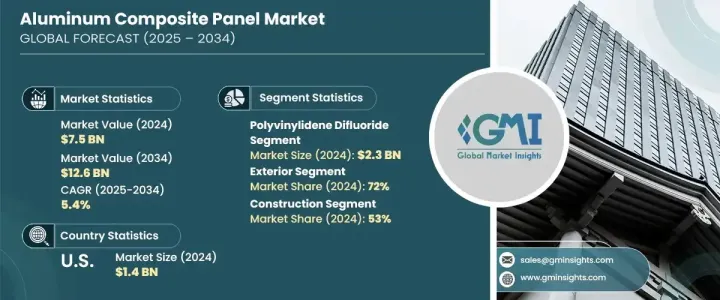
세계의 알루미늄 복합 패널 시장 규모는 2024년 75억 달러로 평가되었습니다. 급속한 도시화, 인프라 개척의 확대, 근대 건축의 미관 중시의 고조가 돌풍이 되어 CAGR 5.4%를 나타내 2034년에는 126억 달러에 달할 것으로 예측되고 있습니다. 알루미늄 복합 패널(ACP)이 점점 선호되는 옵션이 되고 있습니다. 건설 및 설계 기준을 충족시킬 뿐만 아니라 시공이 용이하고 장기적인 성능을 발휘하는 재료에 대한 강한 수요를 만들어 내고 있습니다. 사이클링 가능한 건축 부재의 채용을 강화하고 있습니다. 이 시장은 성능, 비용 효율성, 뛰어난 설계가 융합된 스마트 시티와 그린 빌딩의 대처에 의한 수요의 현저한 고조를 목격하고 있습니다.

폴리플루오르화 비닐리덴(PVDF) 코팅 분야는 2024년의 평가액이 23억 달러에 이르렀습니다. 고층건축, 상업시설의 외관, 건물 외벽 등에 자주 사용되고 있습니다.
| 시장 범위 | |
|---|---|
| 시작 연도 | 2024년 |
| 예측 연도 | 2025-2034년 |
| 시작 금액 | 75억 달러 |
| 예측 금액 | 126억 달러 |
| CAGR | 5.4% |
2024년 건설 섹터의 점유율은 53%로 압도적이었으며, 프로젝트의 라이프사이클을 통해 디지털 기술의 통합이 진행되고 있는 것이 주요 요인이 되고 있습니다. 건설업자와 계약자는 워크플로우의 정확성을 높이고, 일정을 최적화하고, 현장 안전성을 향상시키기 위해 자동화, 디지털 모델링, 로봇 공학의 활용을 점점 더 추진하고 있습니다. 이러한 혁신은 특히 복잡한 도시 개발에서 작업을 간소화하고 노동 관련 지연을 줄이고 효율적인 프로젝트 수행을 지원합니다. 디지털 전환이 건설 관행을 재구축하는 동안, ACP는 시공 일정을 단축하고 프로젝트 유연성을 향상시키는 데 도움이 됩니다.
2024년 북미의 알루미늄 복합 패널 시장 규모는 14억 달러를 기록했고 인프라 갱신과 스마트 시티 개척에 주력하는 미국이 크게 공헌했습니다. 노후화된 구조물의 근대화 요구가 넓어져, ACP와 같은 경량으로 내후성이 있어, 외형에도 아름다운 소재에 수요가 높아지고 있습니다. 이 지역은 또한 에너지 효율적이고 지속 가능한 건축자재에 대한 정부의 지원으로 상업 및 주택 건설에서 강력한 성장을 이루고 있습니다. 알루미늄 복합 패널은 그 다목적성과 그린 빌딩 기준에의 적합성으로부터 인기를 모으고 있으며, 북미의 도시 경관 전체에서 선호되는 솔루션이 되고 있습니다.
세계의 알루미늄 복합 패널 산업에서 사업을 전개하고 있는 주요 기업으로는 알마네이트, 미쓰비시화학, 알폴릭 머티리얼, 알텍, 비바 ACP, Alumaze, Alfrex, Yaret, 3A Composites, Alucopanel, Stacbond, Alstrong, Alcoa, Alumax Industrial, Vanco 등이 있습니다. 이러한 기업은 진화하는 건축 규범에 대응하기 위해 특히 친환경 패널 및 내화 패널의 제품 혁신에 주력하고 있습니다. 이해관계자와의 전략적 협력관계는 장기계약의 확보에 도움이 되고 있습니다. 또한, 주요 기업은 특히 신흥의 대도시권에서 생산시설이나 판매대행망에 투자함으로써 지리적 범위를 확대하고 있습니다.
The Global Aluminum Composite Panel Market was valued at USD 7.5 billion in 2024 and is estimated to grow at a CAGR of 5.4% to reach USD 12.6 billion by 2034, fueled by a combination of rapid urbanization, expanding infrastructure development, and growing emphasis on modern architectural aesthetics. As urban centers expand globally, there is a marked shift toward construction materials that combine durability, flexibility, and visual appeal-making aluminum composite panels (ACPs) an increasingly favored choice. Governments and private developers alike are channeling substantial investments into commercial buildings, residential complexes, airports, and transportation hubs. This ongoing infrastructure transformation creates a strong demand for materials that not only meet structural and design standards but also offer ease of installation and long-term performance. Additionally, the global push for sustainable construction is intensifying the adoption of energy-efficient and recyclable building components like ACPs. The market is witnessing a noticeable uptick in demand from smart cities and green building initiatives, where performance, cost-efficiency, and design excellence converge.

The polyvinylidene difluoride (PVDF) coating segment reached a valuation of USD 2.3 billion in 2024. These coatings are widely recognized for their resilience under extreme environmental conditions, making them indispensable in demanding architectural settings. Known for their chemical resistance, long-term color stability, and durable surface finish, PVDF-coated panels are commonly used in high-rise structures, commercial facades, and exterior building envelopes. Their ability to retain aesthetic value while minimizing maintenance costs continues to attract strong market interest. As architects and developers prioritize performance and longevity, PVDF-coated ACPs are becoming a standard specification across new builds and retrofit projects alike.
| Market Scope | |
|---|---|
| Start Year | 2024 |
| Forecast Year | 2025-2034 |
| Start Value | $7.5 Billion |
| Forecast Value | $12.6 Billion |
| CAGR | 5.4% |
The construction sector accounted for a commanding 53% share in 2024, driven largely by the rising integration of digital technologies throughout project lifecycles. Builders and contractors are increasingly leveraging automation, digital modeling, and robotics to enhance workflow accuracy, optimize timelines, and improve safety across job sites. These innovations streamline operations, reduce labor-related delays, and support efficient project execution, especially in complex urban developments. As digital transformation continues to reshape construction practices, ACPs are proving instrumental in accelerating installation timelines and improving project flexibility.
North America Aluminum Composite Panel Market was valued at USD 1.4 billion in 2024, with the U.S. contributing significantly due to its focus on infrastructure renewal and smart city development. A widespread need for modernizing aging structures is boosting demand for lightweight, weather-resistant, and visually attractive materials like ACPs. The region is also witnessing strong growth in commercial and residential construction, further propelled by government support for energy-efficient and sustainable building materials. Aluminum composite panels are gaining popularity for their versatility and compliance with green building standards, making them a preferred solution across urban landscapes in North America.
Major players operating in the Global Aluminum Composite Panel Industry include Alumanate, Mitsubishi Chemical Corporation, Alpolic Materials, Alutec, Viva ACP, Alumaze, Alfrex, Yaret, 3A Composites, Alucopanel, Stacbond, Alstrong, Alcoa, Alumax Industrial, and Vanco. These companies are focusing on product innovation, particularly in eco-friendly and fire-resistant panels, to meet evolving construction norms. Strategic collaborations with architects, builders, and public sector stakeholders are helping secure long-term contracts. Moreover, key players are expanding their geographic reach by investing in production facilities and distributor networks, particularly in emerging metropolitan regions.